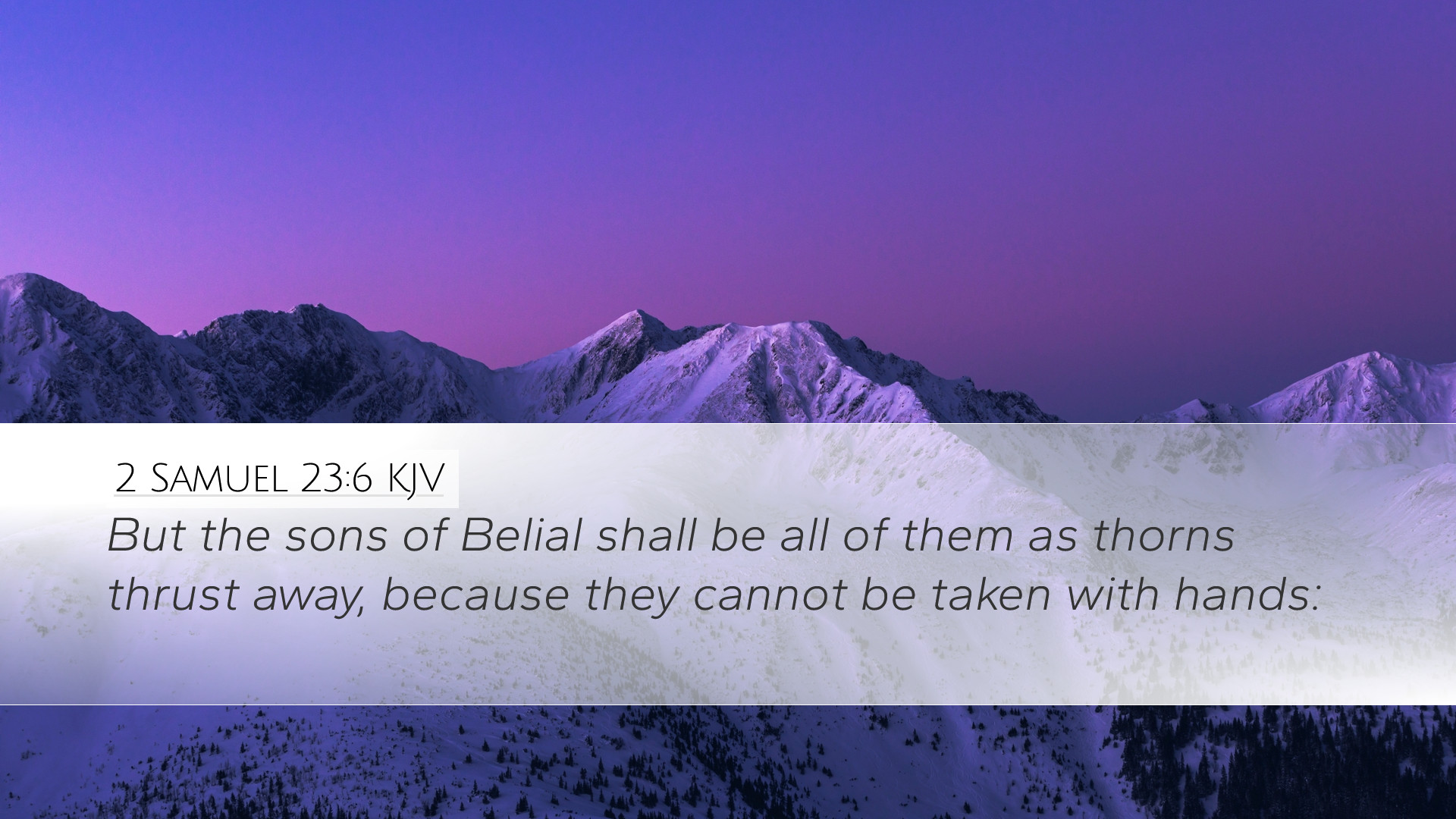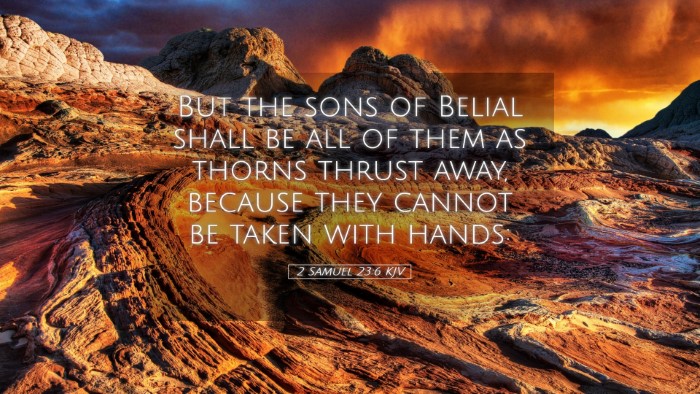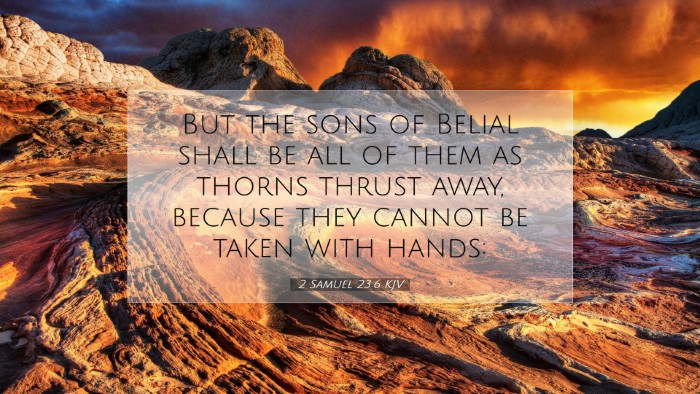Commentary on 2 Samuel 23:6
Verse (2 Samuel 23:6): "But the sons of Belial shall be all of them as thorns thrust away, because they cannot be taken with hands."
Introduction
This verse is part of the last words of David and presents a stark dichotomy between the righteous and the wicked. It addresses the inevitability of judgment and the worthlessness of the ungodly. In understanding this verse, we draw from notable public domain commentaries to explore its implications and applications for contemporary readers, especially pastors, students, and theologians.
Contextual Overview
The setting of 2 Samuel 23 gives insight into David's reflections on his reign and God's faithfulness. This chapter provides a poetic conclusion to the narrative, highlighting not just David's achievements but also providing prophetic insight into the future of the Israelites and the moral fabric of leadership.
Historical Context
- David's Leadership: David had witnessed both the blessings and the challenges of ruling over Israel. As he approached the end of his reign, he reflects upon the realities of governance, including the presence of deceit and corruption.
- Spiritual Implications: Throughout Israel's history, the term "sons of Belial" is synonymous with wickedness and moral decay. The imagery of thorns serves as a metaphor for the detrimental effects these individuals have on society.
Commentary Insights
Matthew Henry's Commentary
Matthew Henry emphasizes the futility of the wicked, represented as "thorns." He notes that in the agricultural culture of ancient Israel, thorns are essentially useless; they cannot be gathered or used for anything productive. This illustrates that those who oppose God and His purposes ultimately contribute nothing of value to society and face inevitable removal from His favor.
Albert Barnes' Notes
Albert Barnes elaborates by drawing a parallel between the spiritual danger posed by the ungodly and the physical threat of thorns. Just as thorns can injure and hinder those who encounter them, so too do the 'sons of Belial' threaten spiritual progress and vitality. Barnes suggests that the judgment of these characters is certain, reflecting the broader biblical principle of sowing and reaping.
Adam Clarke's Commentary
Adam Clarke provides a more personal reflection on the term "thorns." He posits that the righteous must respond to wickedness with resolute judgment. Clarke articulates that the practical application of this verse lies in recognizing the dangers posed by 'sons of Belial' in our midst, urging believers to maintain a clear distinction between good and evil while pursuing justice and righteousness.
Thematic Analysis
Wickedness and Its Consequences
2 Samuel 23:6 serves as a warning of the inevitability of divine judgment on those who choose to turn away from God. The Bible consistently affirms that sin and rebellion against divine order ultimately lead to destruction.
Righteousness as a Protective Barrier
Conversely, the text underscores the importance of righteousness. In pastoral contexts, leaders are reminded to cultivate attributes of godliness that distinguish them from the wicked. Pastors can reflect this in their teachings, emphasizing the need for holiness and a commitment to justice.
The Nature of Spiritual Warfare
The challenge posed by 'sons of Belial' reveals the ongoing nature of spiritual warfare. Understanding the implications of this verse encourages believers to engage actively in prayer, discernment, and community accountability, ever aware that moral decay can spring up around them.
Practical Applications
For Pastors and Church Leaders
- Promote Discernment: Equip congregations with teaching that fosters discernment regarding influences in their lives, reflecting on James 1:5 – seeking wisdom liberally.
- Encourage Accountability: Foster an environment where accountability is paramount, encouraging members to build one another up in faith and integrity.
- Stand Firm on Truth: Uphold moral and biblical standards within the church, reflecting a clear understanding of God’s righteousness.
For Students and Theologians
- Engage with the Text: Study this verse in conjunction with surrounding scripture to fully grasp its implications on leadership, morality, and community.
- Historical Analysis: Examine the history of Israel’s leadership and the constants of spiritual warfare as addressed in the Old Testament.
- Develop Theological Discernment: Reflect on the attributes of God’s justice and righteousness as key themes of Scripture.
Conclusion
2 Samuel 23:6 presents profound truths about the fate of the wicked contrasted with the righteous. By examining this text through the lenses of historical context and faithful commentary, we see its lasting implications. As believers today, we are called to remain vigilant against the encroaching influence of wickedness while holding fast to our identity in Christ, who is our ultimate hope and protector. The call to discernment and righteousness remains as pertinent today as it was in David's time, challenging us to reflect on our spiritual responsibilities.


